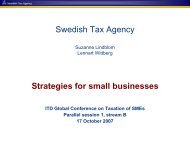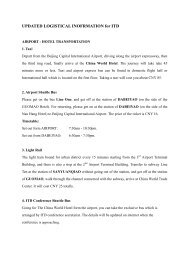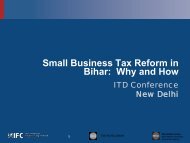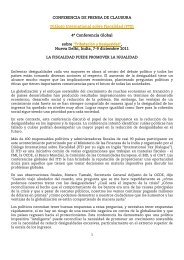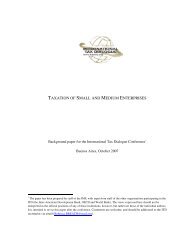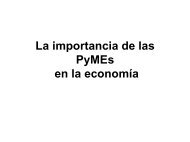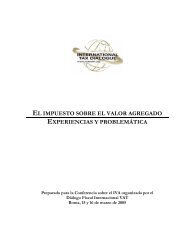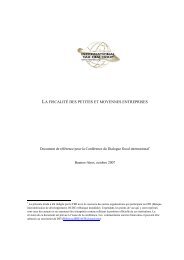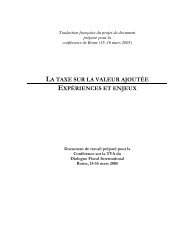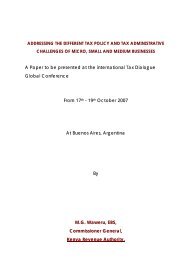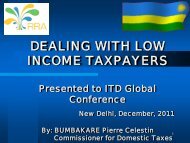Arcotia Hatsidimitris - International Tax Dialogue
Arcotia Hatsidimitris - International Tax Dialogue
Arcotia Hatsidimitris - International Tax Dialogue
Create successful ePaper yourself
Turn your PDF publications into a flip-book with our unique Google optimized e-Paper software.
42 – 5. MAINTAINING PROGRESS, TACKLING DELAY<br />
The results of the initial survey show that transfer pricing cases tend to take a long time to resolve<br />
and that major cases can take many years. There are many different challenges to maintaining progress<br />
in a transfer pricing audit or enquiry. Although these vary depending on the complexity of the case,<br />
the experience and skills of the tax administration and the level of co-operation of the business and its<br />
advisers, the impact of delay is normally the same – additional cost for both the tax administration and<br />
the business. The parties in a transfer pricing case may have different views on the causes of the delay,<br />
but feedback from business, advisors and tax administrations suggests that there are some common<br />
themes. This chapter considers specifically the main causes of delay and the methods tax<br />
administrations, business and their advisors find most effective in overcoming them.<br />
Obtaining and managing business records: documentary evidence<br />
Requests for business records<br />
Delay in obtaining business records is one of the aspects of transfer pricing that concern most tax<br />
administrations. A co-operative relationship between a business and a tax administration will<br />
generally ensure that the right business records needed for a transfer pricing audit or enquiry are<br />
provided within a reasonable timescale. However, where that does not happen, tax administrations<br />
need to have effective powers to obtain business records, backed by appropriate sanctions for noncompliance.<br />
Documentation regimes and requirements are covered in Chapter 3, some of which<br />
include specific obligations to maintain transfer pricing documentation. In Denmark, if the taxpayer<br />
has not provided the documentation or if the documentation is insufficient and the taxpayer does not<br />
comply with supplementary information requests, SKAT has the power to estimate the amount of any<br />
transfer pricing adjustment that may be necessary. The estimate must be supported by evidence.<br />
However, the courts are more reluctant to override estimates where the taxpayer has provided<br />
insufficient information to SKAT. The power to estimate the amount of any transfer pricing<br />
adjustment in cases of non-compliance with information requests acts as an incentive for the taxpayer<br />
to comply with such requests.<br />
In countries where MNEs tend to operate through subsidiaries or permanent establishments and<br />
are not headquartered in the country, obtaining access to relevant business records that are not in the<br />
power of the local management can pose a particular problem for tax administrations. The CRA now<br />
regularly involves its lawyers in the early fact finding stages of an audit. This can be helpful, both in<br />
framing requests for business records and in demonstrating a readiness to enforce those requests if<br />
necessary. When the local management of a subsidiary or branch seems unwilling or unable to<br />
comply with an information request, contacting, or even simply signalling a willingness to contact, the<br />
Competent Authority of the country in which the MNE is headquartered and the senior managers of<br />
the MNE can be very effective. In one case Finland needed information from a parent company in<br />
Denmark and contacted their colleagues in Denmark. SKAT undertook its own audit and that helped<br />
close the case in Finland.<br />
Business records: document management<br />
Transfer pricing audits and enquiries are fact intensive and therefore the volumes of documentary<br />
evidence that make up business records can be very substantial indeed. In large cases involving many<br />
transactions, complex business models and supply chains, the volume of relevant documentation can<br />
be overwhelming. There can also be a tendency for tax administrations which lack relevant industry<br />
experience to seek substantially more business records than are really needed, or can readily be<br />
managed. In addition business raised concerns that tax administrations sometimes fail to recognise the<br />
limited resources available in a business to deal with extensive information requests. This underlines<br />
the importance of making any business record information requests focused and pertinent. On the<br />
DEALING EFFECTIVELY WITH THE CHALLENGES OF TRANSFER PRICING © OECD 2012



